Sardinia2030 – english version
The Sardinia2030 Regional Strategy
The Sardegna2030 Regional Strategy, approved on 6th October 2021, is the long-term vision for the Sardinia we want by 2030. An agenda of goals to be achieved and actions to be taken. It has been developed through a participatory process rooted in documents, plans and programmes, primary and secondary source data, and extensive information shared during the activities carried out in the framework of a governance that involves public and private stakeholders - as described in Chapter 2. Right now, the governance is working for the implementation of the Strategy with the same participatory, open, inclusive, and transparent approach.
Following the sustainable development method according to the 2030 Agenda and its SDGs, the Strategic Regional Goals of the Sardegna2030 Strategy are based on environmental protection, well-being and social inclusion, and prosperity and economic equity. All these elements are interlinked and cannot be compartmentalised, they definitely share the transverse focus of the education and the governance culture.
Human well-being is intrinsically linked to the health of the natural ecosystems to which it belongs, just as Sardinia is a constituent element of the global environment. Moreover, the climate crisis and the growing awareness of the effects of climate change, calls us to the need of economic and social models in terms of sustainable development. The Regional Strategy for Sustainable Development Strategy represents an important opportunity to integrate aspects of climate change mitigation and adaptation into the regional programming and planning. The Regional Climate Change Adaptation Strategy (adopted by the Autonomous Region of Sardinia on 5th February 2019), was drawn up based on a specific study on future climate scenarios of Sardinia to 2050. Then, the Objectives of the Regional Strategy for Sustainable Development have been developed within this specific regional framework.
Sardegna2030 should be seen with an open eye on our territory but also on the rest of the planet, where the cultural element and the collaboration between institutions and citizenship promote and support policies focused on integration and the wellbeing for all, leaving no-one behind.
Strategic Themes and Objectives of the Regional Strategy
The central role of the Sustainable Development Goals (SDGs) of the 2030 Agenda within the European Cohesion Policy for the period 2021–2027 has been the lighthouse of Sardegna2030 to the extent that the 5 EU policy objectives coincide with the 5 Strategic Themes of the Regional Strategy, with a specific declination:
A SMARTER SARDINIA with a strengthened administrative capacity, a greater competitiveness of the production system oriented towards innovation.
A GREENER SARDINIA, for the conservation, management, and enhancement of resources and land for an ecological and resilient transition and climate change.
A MORE CONNECTED SARDINIA, for an inclusive connectivity based on sustainable mobility and digital accessibility.
A MORE SOCIAL SARDINIA, for a widespread well-being based on health, training, skills and work, social inclusion, equality, and culture.
A SARDINIA CLOSER TO CITIZEN, that invests in the governance for territorial development plans.
The Strategic Objectives of Sardegna2030 are inevitably multidimensional, synergic, and complementary. This means that each Strategic Theme, Strategic Objective, Line of Intervention, or Action should not be read individually or be considered self-supporting. Therefore, Sardinian Sustainable Development Strategy can only find the right implementation in the intersection of the 5 Themes, in the governance, and in the continuation of the participatory process with its constant updating, sharing, dialogue openness, and creation of culture.
The Regional Sustainable Strategy Development Sardegna2030 consists of:
- 5 Strategic Themes
- 34 Strategic Objectives
- 104 Lines of Action
- 571 Actions
- 102 Indicators
- 41 Targets
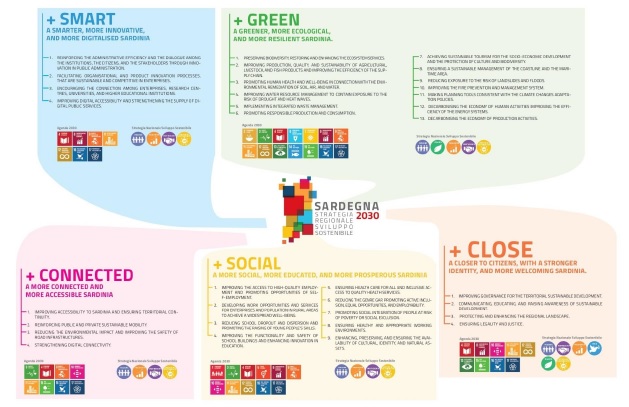
Monitoring Sardegna2030: targets and indicators
The descriptive framework of each Strategic Theme is correlated by a matrix reporting the Indicators and the Targets for Sardegna2030. In fact, The Strategy is also supported by a monitoring system composed of a specific set of indicators that can support and drive the implementation of the Actions and the Policies. The achievement degree of Sardegna2030 is measured through a set of defined targets, the revision of the initial context analysis, and any re-evaluation and redirection of the strategic action lines.
The monitoring system consists of:
A set of 102 indicators providing a detailed, complete, and comparable graphic representation with data from other Italian regions and with Italian national averages.
A set of 41 targets representing the desired value in 2030: which is the goal to be achieved by Sardegna2030.
Integration between strategies and programs
Sardegna2030 is consistent with the Goal 17 of the 2030 Agenda, “Partnership for Goals”, that reinforces the principle of promoting inclusive collaborations built on universally valid principles and values, a common vision and shared goals, considering that the regional development policies must be integrated, must dialogue and create synergies that enhance public actions to be truly effective
The result of this work is displayed in the official document of the Strategy through a correlation matrix where each Strategic Objective is linked with the 2030 Agenda, with the National Strategy for Sustainable Development, and with all the opportunities available at regional level offered by European, national and regional plans, programmes and funds such as the ERDF and the ESF+ Programmes, the Regional Development Programme, the European Maritime and Fisheries Fund (EMFF), the European Regional Development Fund (ERDF), the Smart Specialisation Strategy (S3) and many more.
The governance system for Sardegna2030
The Autonomous Region of Sardinia has activated a governance system aimed at creating an effective team building system, through a multi-stakeholder, learning-by-doing, empowerment process.
The Sardegna2030 governance is organised into four different integrated levels:
- External-international level, which consists of the UN/EU commitment to the 2030 Agenda and other players, including the Regional Network for International Cooperation.
- External-national level, which belongs to the collaboration between the Ministry for the Ecological Transition and the interregional governance for the development of climate change adaptation and ecological transition tools.
- Regional-local level, which involves the local institutional actors, the entrepreneurs, the third sector, and the civil society and plays a central role in operationalising the sustainable development vision, contributing to the SDGs achievement.
- Regional-internal level, which can be associated with the internal governance of the regional system (departments, bodies, regional agencies), which ensures the activation of all the levels of the public administration and the balance among them.
The regional governance is coordinated by the Regional Department of Environmental Defence developed within the reference frame represented by the National sustainable development strategy and the ongoing collaborative relationships with the Ministry for Ecological Transition and the stimuli/prompts of the interregional table.
The regional governance is composed of the internal level, the local level, and the interconnecting venues formed by the Regional Forum for Sustainable Development, the spatial planning and development processes, and the strategic environmental assessment procedures.
The Regional Forum for Sustainable Development is composed of local authorities, enterprises, associations, and the whole of civil society. The Forum is a permanent platform, created for the Strategy design process and now the implementation process is ongoing. It has experienced dozens of collective moments of thematic analysis and territorial insight, profiting from the rich participation and valuable input offered by the stakeholders. It is a permanent laboratory that has helped to understand the local reality through a choral/comprehensive process involving the entire administration and civil society in cross-sectoral working groups with a wide range of skills, approaches, and experiences.
The process of spatial planning and development is carried out basically through the ERDF. This process, for the period 2021-2027, has been closely interrelated with that of Sardegna2030, as we will describe more in the next chapter.
The Strategic Environmental Assessment procedures (SEA) procedure is undergoing a phase of evolution driven precisely by the evolution of the sustainability approach and the NSDS. At the regional level, some territories and local authorities are experimenting with procedures that allow the interconnections between environmental, social, and economic sustainability to be included in the strategic assessment.
The Institutional Steering Committee was established, at regional level, to ensure a direct engagement in the Strategy design and implementation process, between the Departments and Regional Agencies coordinated by the Regional Directorate for Environmental Protection. Its main operational tool is the Interdepartmental Working Group, coordinated by a small working group of the Environment department (Coordination Group). The Interdepartmental Working Group is composed of more than 100 civil servants, delegated representatives of the Directorates-General of each regional department and of the various Bodies and Agencies of the regional system. It has generated a lifelong learning laboratory, a perfect place that has tested the collective thinking power, where traditional paradigms have been constantly questioned by problem analysis and the identification of potential solution, following integrated approach of the 2030 Agenda, converging in the Sardegna2030 Strategy.
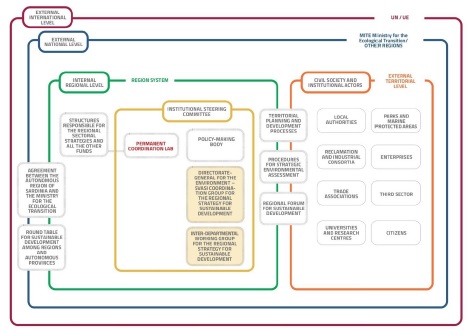
Engaging local stakeholders: the Regional Forum for Sustainable Development
The Regional Forum for Sustainable Development is a meeting point for Institutions, enterprises, and third sector, that aims to define strategic priorities and concrete actions on different aspects on the economic, social, cultural, and environmental dimensions at regional scale, coherently with the 17 SDGs and the 169 targets of the 2030 Agenda.
The Forum is meant to be a space to inform, listen, share, and consult other participant to define the strategic vision and the regional objectives, to implement and monitor them, and to assure the dialogue and the exchange among all the social parties involved. The participatory process has been structured based on specific participatory methodologies and software for digital interaction and co-design. It has stimulated the contribution of the research world and the civil society, including associative, economic, environmental, cultural, and social realities, citizens, and the local institutions through the Territorial Tables.
The process was run under the banner of values such as participation and inclusion, responsibility, transparency, coherence, effectiveness, ethics and justice, and circularity.
The Charter of Values, shared among all participants, had the purpose of enhancing the culture of sustainability and spreading the dissemination of values, common basic principles, which could create the conditions to ideate, design and act while remembering different aspects such as the quality of life, the social inclusion, the economic growth, never forgetting the biosphere vulnerability and the protection need.
During the drafting period of the Sardegna2030 Strategy, it has been adopted an approach able to activate and promote the learning process and the empowerment among the local actors (public authorities and civil society), to co-build new content and values, and to stimulate the local actors to become active partners drafting and implementing the Strategy. From March to October 2021, during 14 laboratories, the Forum reached and engaged a broad number of stakeholders (more than 3300 registered visitors) with a high attendance rate. The Forum (14 laboratories/events organised from March to October 2021) was structured in the following way:
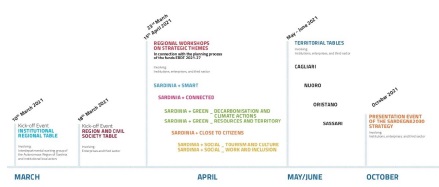
Since its approval, we have focused on the dissemination of the Sardegna2030 Strategy and on giving continuity to the spirit of collaboration that has been activated. In particular, the activities of the Forum are now continuing through workshops aimed at specific targets. This choice was guided by the desire to focus attention on a capillary adaptation of the lines of intervention to individual specificities. In addition, there are call-to-action initiatives addressed to young people and citizenship, as well as larger initiatives such as the Sardegna2030 Festival, as shown below:
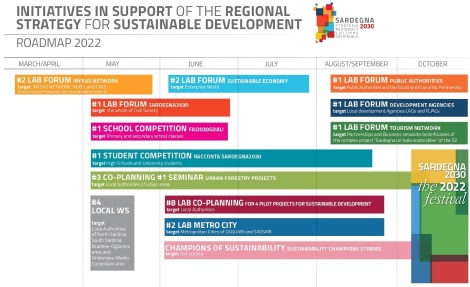
From the 2030 Agenda to Sardegna2030 through the European Cohesion Policy
The Interdepartmental working group and the Forum has raised up a relevant point: the policy integration and coherence among all the tools and the Programmes available at all levels, from global to local.
We addressed this issue by integrating the Sardegna2030 process with the planning of the Implementation Programmes of the European Funds, thanks to the direct involvement of the Regional structures in charge of programming the European Funds within the Interdepartmental Working Group.
The territorial workshops on strategic issues, activated in the framework of the Forum, have been jointly implemented and have been instrumental in the drafting of both the Sardegna2030 strategy and the Regional Operational Programmes (ROPs) financed by the ERDF.
As just mentioned and as reported in Chapter 2, the Sardegna2030 Interdepartmental Working Group includes the representatives of the Managing Authorities of the Regional Operational Programmes financed by the European Regional Development Fund, European Social Fund Plus, Fund for Development and Cohesion, and European Agricultural Fund for Rural Development. Moreover, civil society and local institutions are involved in spaces for discussion and information through Territorial Boards and the Regional Forum for Sustainable Development.
It must be emphasised that the European institutions has defined the Cohesion Policy for the period 2021–2027 highlighting the central role of the sustainable development goals (SDGs) of the 2030 Agenda and their strategic relevance for the future of the EU itself, and for the definition of the Multiannual Financial Framework (MFF).
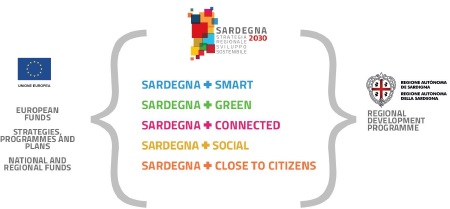
Take a look to the Voluntary Local Review (VLR) of the Sardinia2030 Regional Strategy (click here);